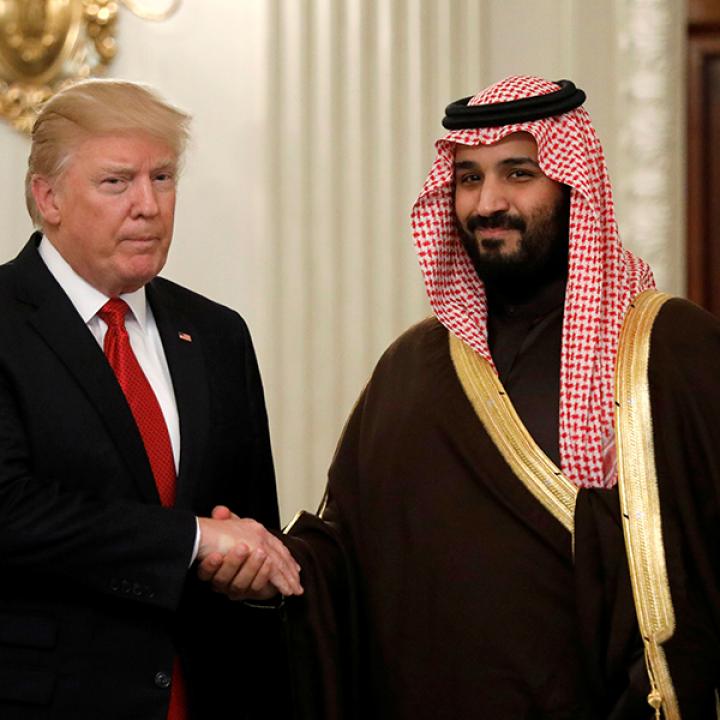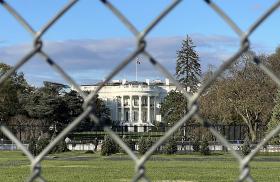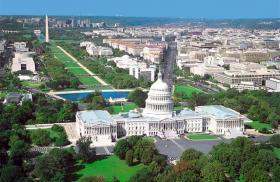
- Policy Analysis
- Articles & Op-Eds
Trump in His Happy Place: Purple Carpets and Big Deals in Saudi Arabia
Also published in Arabian Gulf Business Insight

Maintaining the trip’s momentum and atmosphere could prove challenging as he travels to other stops and then returns to Washington.
President Trump, now halfway through his Middle East trip, seems to be enjoying every minute. He is said to be in his “happy place.”
Tuesday was spent in the Saudi capital Riyadh, where he announced a $600 billion commitment by the kingdom to invest in the US. The main headline was “the largest defence sales agreement in history”—nearly $142 billion, providing Saudi Arabia with state-of-the-art warfighting equipment and services from over a dozen US defence firms.
Back home in Washington DC, the foreign policy bubble was open-mouthed at the size of the deals and collectively wondered how the headline figure of $600 billion was reached. (The answer may well be the calculation of the long-term revenue from the sales of training, spare parts and replacement of equipment over the next decade or so. Whether this arithmetic placates Trump’s domestic opponents and critics is another question.)
Matching the announcement were the ceremonies, which Trump and Saudi Crown Prince Mohammed bin Salman seemed to enjoy equally. The Financial Times headline of May 12—“Donald Trump seeks bromance and billions as he heads to the Gulf”—accurately predicted the atmosphere, achieved in part by classy choreography. A purple carpet covered the aircraft steps and was repeated in the meeting hall. Trump’s suit and tie seemed coordinated with the Prince’s robes and the uniforms of the royal guards. Nothing clashed. Big tick for the visuals.
Going forward, the challenge now is to maintain the momentum and atmosphere of the trip. After an overnight stay at the Riyadh Ritz-Carlton, where corrupt Saudi billionaires were infamously shaken down during involuntary stays in late 2017, Trump is due to attend a Gulf Cooperation Council summit in the Saudi capital.
The big question is whether Saudi King Salman will make an appearance despite his increasing old age and infirmity. The leaders of Kuwait, Bahrain and Oman, or their substitutes, will be there though, even if they are actually irritated that their capitals were not on the president’s itinerary. One major triumph for Syria, however, is that Trump will reportedly meet its new president, who was until recently labelled a terrorist by Washington.
Then Air Force One is off to the Qatari capital Doha, where the headlines of the advance stories are already almost hysterical. The Qataris are apparently gifting Trump a $400 million Boeing 747, luxuriously appointed, as a new Air Force One because Boeing is being slow about completing an order in the US.
The propriety of the deal is questionable. A more obvious doubt is whether such an aircraft can even act as an airborne nuclear command post with just a few adjustments to the wiring. (Answer: It can’t.)
Qatar is also in the sights of its critics in Washington because of its contacts with Hamas, which is holding Israeli hostages in Gaza. Trump appears to be frustrated by the intractability of the situation and the stubbornness of Israeli Prime Minister Binyamin Netanyahu, so he has detailed his diplomatic problem-solver buddy Steve Witkoff to resolve the situation. Edan Alexander, an American/Israeli hostage, has been released, but a projected meeting with Trump in Qatar to publicly thank him personally isn’t going to take place.
Observers are watching for another US angle in Qatar. Two of his sons have a deal to develop a golf course and resort there. Trump’s commercial interest is supposedly zero but few believe it. What is going to happen?
Emir Tamim Al Thani, Qatar’s ruler, is not known to play golf but cannot ignore an opportunity to further cement ties with the president. (Eight years ago, soon after the then newly-minted President Trump had visited Riyadh, the Saudis along with the Emiratis and the Bahrainis started a diplomatic and economic blockade of Qatar, alleging support for terrorism. Qatar remains quietly cautious of its Arab neighbours.)
Thursday May 15 is in the UAE capital Abu Dhabi. Can the momentum of the trip be maintained into the third day? Sheikh Mohammad bin Zayed al-Nahayan, the ruler of Abu Dhabi and president of the UAE, clearly hopes so. Artificial intelligence and semiconductors are said to be on the list of agreements to be signed.
In the prevailing business atmosphere, overtly political meetings seem unlikely, except with President Ahmed Al Sharaa of Syria. Palestinian leader Mahmoud Abbas, once mooted to go to Riyadh, is staying at home on the West Bank. It is unclear whether Lebanese President Joseph Aoun will show up.
Speculation that Trump will visit Turkish capital Ankara on his way home to see President Erdogan seems misplaced. The Turkish leader does not seem to “get it” in terms of relations with Trump as the Gulf states have done.
President Trump may well quietly admire the Gulf Arab states for their approach to politics—no tolerance of political opposition. Coming back to Washington will immerse him once again in the lively criticism of him and his policies.
He will perhaps be hoping that all the business deals he has signed will bring him popularity. Perhaps eventually they will, but not immediately, although the health of the stock market during his trip is worth noting for some people.
In Middle East terms, the major issues of Gaza, Iran’s nuclear programme and the Houthis of Yemen (with whom Washington has organised a ceasefire) remain. But perhaps, in President Trump’s logic, they are no longer quite so intractable. And again maybe, just maybe, business deals are a route to diplomatic progress. The coming weeks and months will provide an answer.
Simon Henderson is the Baker Senior Fellow at The Washington Institute and director of its Bernstein Program on Gulf and Energy Policy. This article was originally published on the Arabian Gulf Business Insight website.



